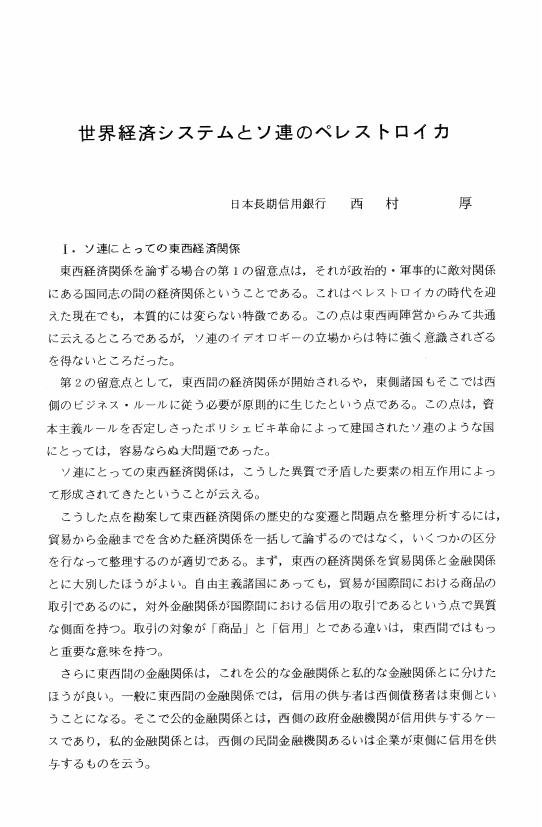2 0 0 0 OA ロシア経済の選択
- 著者
- 西村 厚
- 出版者
- ロシア・東欧学会
- 雑誌
- ロシア・東欧研究 (ISSN:13486497)
- 巻号頁・発行日
- vol.2002, no.31, pp.3-19, 2002 (Released:2010-05-31)
- 参考文献数
- 2
Throughout these ten or twenty years, most communist countries have been trying economic transition to market economy. Now we can observe very different performances in their economic reforms. For instance, China as successful case and Russia as failed case. The way of Russian economic reform is understood to be shock therapy or big bang approach including political revolution. The Chinese approach is gradualism without political revolution.The purpose of this paper lies in analyzing the performance of transition economies through comparative study with Russia, Poland and China, aiming at finding the significant factor to influence the performance of transition economies. First, this paper focuses on the comparative study with Poland and Russia. Both countries adopted big bang approach after political revolution. However, both economies have revealed impressive contrasts in economic performance. Poland has succeeded to stabilize and develop her economy. On the other hand, Russia, going through the very long transformational recession, has not succeeded to develop her economy. Looking at macroeconomic factors, Russian current balance of payment has been sufficient, coming from oil export. On the other, Poland's one has been deficit. The contrasts in economic performance of both countries did not come from political or macroeconomic factor, but mainly came from the performance of financial reform. In the process of economic reform, Poland succeeded to build the reliable networks of commercial bank, but Russia did not succeed it. In Poland, most of national saving has been turning to investment in domestic industrial sectors through banking networks. On the other, huge saving of Russia has been running away to abroad without domestic money flow system. Even the Putin Regime, who has been trying to normalize the Russian system, has not been so eager to build the reliable banking network.China has dramatically succeeded to make economic reform under communist regime. The Chinese way of financial reform is interesting and paradoxical. Poland and Russia separated and privatized the former national banking system. The financial reform of Poland produced the nine national commercial banks, and has gradually privatized them. On the other hand, Russia separated and privatized the national banking system in the same time. The Russian financial reform produced more than two thousands small size banks that has not been trusted by Russian people. China has not been adopting such drastic separation and privatization, but sustaining the national banking system, under which China has been developing her economy. Even though the national commercial banks of China have been suffering the bad asset issue, Chinese people have been trusting the domestic banking system.
1 0 0 0 OA 世界経済システムとソ連のペレストロイカ
- 著者
- 西村 厚
- 出版者
- THE JAPANESE ASSOCIATION FOR RUSSIAN AND EAST EUROPEAN STUDIES
- 雑誌
- ソ連・東欧学会年報 (ISSN:03867226)
- 巻号頁・発行日
- vol.1988, no.17, pp.12-21, 1988 (Released:2010-03-16)
1 0 0 0 証券化時代の危機政策
- 著者
- 西村 厚
- 出版者
- 外国為替貿易研究会
- 雑誌
- 国際金融 (ISSN:02877953)
- 巻号頁・発行日
- no.1200, pp.30-36, 2009-05-01
